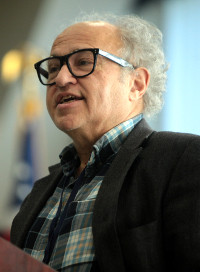Includes information about his family, academic work, writings (libertarian, professional and novels) and his interests (recreational medievalism, in particular)

David Director Friedman (born 12 February 1945) is an American economist, physicist, legal scholar and libertarian theorist. He is known for his textbook writings on microeconomics and the libertarian theory of anarcho-capitalism, which is the subject of his most popular book, The Machinery of Freedom. Besides The Machinery of Freedom, he has authored several other books and articles, including Price Theory: An Intermediate Text (1986), Law's Order: What Economics Has to Do with Law and Why It Matters (2000), Hidden Order: The Economics of Everyday Life (1996), and Future Imperfect (2008).
Home Page
Includes information about his family, academic work, writings (libertarian, professional and novels) and his interests (recreational medievalism, in particular)
Reference
Biographical essay, including list of books authored by Friedman
Images
200x262 JPEG, color
Born
Biography
Web Pages
Includes picture and biography from Laissez Faire Books
Articles
Examines the validity of the concept of "market failures" as an argument for government intervention, reviewing arguments made by David Friedman in the article "Do We Need Government?", Liberty, Dec 2005
Originally published at HarryBrowne.org; defends the free market and individual liberty, quoting among others Bastiat, Thomas Jefferson, David and Milton Friedman, John Lott, Isabel Paterson, Proudhon, Adam Smith, Sowell, John Stossel and Walter Williams
Writings
Poem that introduces part III
Under anarchy there is no government.
Therefore anarchy is chaos.
Q.E.D. ...
My life is chaos turned miraculous;
I speak a word and people understand
Although it must be gibberish since words
Are not produced by governmental plan.
Now law and order, on the other hand
The state provides us for the public good;
That's why there's instant justice on demand
And safety in every neighborhood.
Books Authored
Partial contents: Economics for Pleasure and Profit - Price=Value=Cost: Solving a Simple Economy - In Search of the Real World - Standing in for Moral Philosophy: The Economist as Judge - Applications: Conventional and Un
- ISBN 0887307507: Hardcover, HarperBusiness, 1st edition, 1996
- ISBN 0887308856: Paperback, HarperCollins, 1st pbk edition, 1997
Partial contents: What Does Economics Have to Do with Law? - Efficiency and All That - What's Wrong with the World - Defining and Enforcing Rights - Of Burning Houses and Exploding Coke Bottles - The Economics of Contract - Marriage, Sex, and Babies
- ISBN 0691010161: Hardcover, Princeton University Press, 2000
- ISBN 0691090092: Paperback, Princeton University Press, 2001
Partial contents: I: In Defense of Property - II: Libertarian Grab Bag or How to Sell the State in Small Pieces - III: Anarchy is not Chaos - Socialism, Limited Government, Anarchy, and Bikinis - IV: For Libertarians—An Expanded Postscript
- ISBN 0870004204: Hardcover, Arlington House, 1978
- ISBN 0060910100: Paperback, Harper & Row, 1973
- ISBN 0812690699: Paperback, Open Court Publishing Company, 2nd edition, 1989
Partial contents: I: Economics for Pleasure and Profit - II: Price = Value = Cost: Competitive Equilibrium in a Simple Economy - III: Complications, or Onward to Reality - IV: Judging Outcomes - V: Applications - Conventional and Un
- ISBN 0538080507: Hardcover, South-Western Educational Pub, 1986
- ISBN 0538805641: Hardcover, South-Western Educational Pub, 2nd edition, 1992
Videos
Exploring Liberty: The Machinery of Freedom, 6 Mar 2012
Friedman discusses the premises of The Machinery of Freedom, among other things, the use of arbitration to settle disputes between private rights enforcement agencies, the hard problem of national defense and anarcho-capitalism
The Machinery Of Freedom: Illustrated Summary, by David D. Friedman, Tomasz Kaye (illustrator), 4 Apr 2012
Excellent animated illustration of part of the talk "Exploring Liberty: The Machinery of Freedom" given by David Friedman, voiced by himself
The introductory paragraph uses material from the Wikipedia article "David D. Friedman" as of 6 Jun 2018, which is released under the Creative Commons Attribution-Share-Alike License 3.0.
